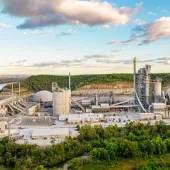Cement producers rising to the challenge

New cement sustainability report highlights proactive and innovative approach towards sustainable future
THE Mineral Products Association (MPA) Cement has published its 2014 Sustainable Development report, which demonstrates how UK cement manufacturers are rising to the challenge of supplying responsibly sourced materials when UK-specific carbon costs applied to the sector remain a major burden and potential threat to the future of this indigenous industry.
Dr Pal Chana, executive director of MPA Cement, commented: ‘MPA Cement is now increasing its value to society by maximizing the opportunities that flow from a more circular economy. Cement must be produced as sustainably as possible and we are proud to report on the progress that the industry has made on all aspects of sustainable development, including health and safety, diversity and environmental performance.’
However, MPA Cement say the economic crisis has severely impacted the industry and the nascent economic recovery is fragile. Domestic production of cement and its important contribution to the UK economy is now under real threat from the cumulative pressure of energy, environmental and carbon regulatory costs.
Dr Chana continued: ‘Our companies will continue to enhance UK productivity and innovate if the regulatory framework is supportive. The significant investments already made in emissions reduction by the industry have resulted in a 54% reduction in CO2 emissions since 1990, outstripping the performance of the UK as a whole.
‘As an industry, we are committed to doing everything we can to realize the carbon-reduction ambition set out in the Government’s roadmap and in our own Greenhouse Gas Reduction Strategy. However, government must play its own part by recognizing the competitive challenges placed on our industry and doing more to retain the value arising from domestic cement manufacturing.
‘A more supportive policy framework will enable the cement companies to continue to work with clients in the construction industry to supply local, responsibly sourced building materials for the many projects that are reviving local communities and providing much-needed jobs up and down the country.’
The environmental performance of the industry in 2014 continued to improve. Highlights included:
- The target to reduce the 2013 rate of lost-time injuries by 65% by the end of 2018 and halve the 2013 number of lost-time injuries by the end of 2018 for contractors.
- In 2014, the cement industry continued to be a net consumer of waste and by-products, using 1.6 million tonnes as substitute fuels and raw materials, and not disposing of any cement kiln dust (process waste) to landfill.
- Measured against a 1998 baseline and on a per-tonne basis, actual emissions in 2014 were:
- CO2 emissions directly from cement plants per tonne of Portland Cement equivalent: 26.4% reduction on 1998
- Dust emissions: 82.1% reduction on 1998
- Oxides of nitrogen emissions: 61.9% reduction on 1998
- Sulphur dioxide emissions: 84.1% reduction on 1998
- The target to increase the use of waste-derived fuels to 80% in 2050 and to increase the use of biomass as a kiln fuel to 40% by 2050.
In 2016 MPA Cement will aim to further minimize the use of virgin materials and fuels by publishing its first ‘Resource Efficiency Roadmap’, setting out the industry’s ambitions and its contribution to a circular economy.
Download a copy of the 2014 MPA Cement Sustainable Development report.









